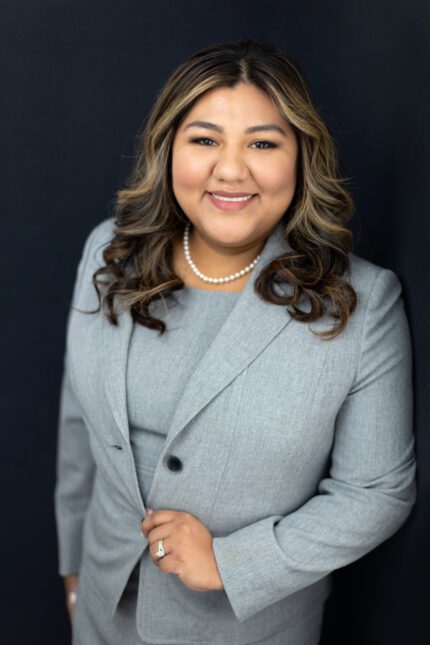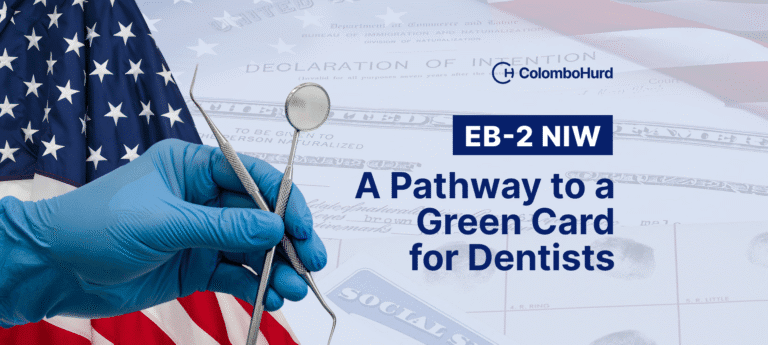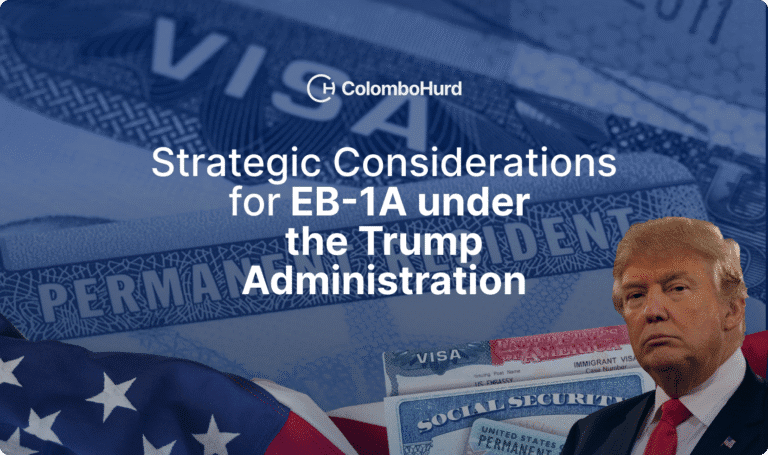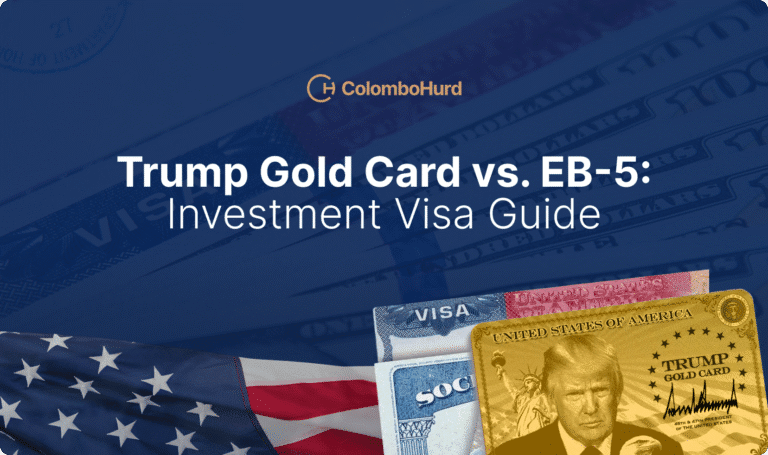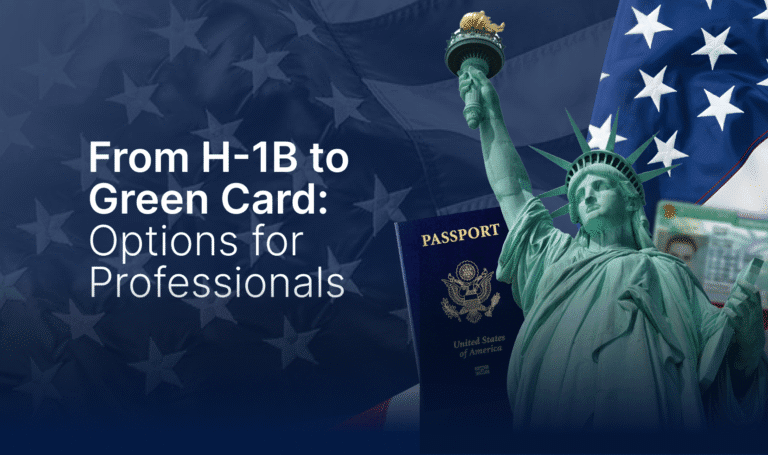For international dental professionals seeking to establish their practice in the United States, the EB-2 National Interest Waiver (NIW) is a pathway to a green card for dentists. This immigration option allows qualified dentists to bypass the traditional labor certification process and employer sponsorship requirements, making it an attractive route for dental professionals ready to make their mark in American healthcare.
Colombo & Hurd Immigration Attorney Veronica Virgen highlights strategies for achieving EB-2 NIW approval for dentists, and shares an approval story for one of her clients focused on oral health.
National Interest Arguments for Dentists
The EB-2 National Interest Waiver pathway recognizes that qualified dental professionals can contribute significantly to American society. While there is a well-documented shortage of dentists in the United States, that fact alone is not enough to qualify for an EB-2 National Interest Waiver. To be successful, a dentist must demonstrate how their work meets a higher threshold—such as offering unique expertise, introducing innovative methods or research, serving a critically underserved population in a targeted way, or otherwise making contributions that go well beyond routine dental practice. USCIS looks for a clear, evidence-based case that the applicant’s contributions are of substantial merit and national importance, not simply that they can fill an existing vacancy.
Technology Integration and Innovation
Modern dental practice increasingly relies on cutting-edge technology. Successful EB-2 NIW cases for dentists often highlight:
- Implementation of advanced diagnostic and treatment technologies
- Digital dentistry innovations that position the U.S. as a global leader
- Integration of minimally invasive treatment approaches
- Development or application of proprietary dental technologies or methodologies
Serving Underserved Communities and Addressing Healthcare Needs
While general workforce shortages alone are insufficient for EB-2 NIW approval, dental professionals can demonstrate national importance through specific approaches to addressing healthcare disparities:
- Providing care in Health Professional Shortage Areas (HPSAs)
- Establishing practices in Opportunity Zones for economic development
- Creating accessible care models for disadvantaged populations
- Contributing to CDC initiatives to reduce oral health disparities
Alignment with Federal Health Goals
Successful cases demonstrate strategic connections between the dentist’s proposed work and broader government initiatives. For example, linking dental care improvements to the United States Department of Health and Human Services’ Healthy People 2030 objectives for oral health can strengthen a petition’s national importance argument. However, the specific alignment strategies and documentation approaches that prove most effective require careful legal analysis tailored to each individual case.
Real Success Stories: Proven EB-2 NIW Strategies
Colombo & Hurd has secured numerous EB-2 NIW approvals for dentists by crafting compelling narratives that demonstrate both merit and national importance. Ms. Virgen highlights two of her recently approved EB-2 NIW cases for petitioners in dental fields:
EB-2 NIW Approval for Technology-Driven Dental Innovation
Ms. Virgen recently secured approval of the petition for EB-2 NIW for a Mexican dentist with a Doctor of Dental Surgery degree. With over 20 years of progressive professional experience as a CEO in the dental industry, this petitioner demonstrated exceptional qualifications that positioned him uniquely to advance American dental healthcare.
The petition focused on information related to access to dental health and the importance of oral health, establishing how his proposed endeavor would drive technological innovation in the dental care field while narrowing gaps in access to oral health care through the provision of services to underserved communities.
His successful petition also detailed his plan to establish a dental clinic, designed to integrate cutting-edge technology into predictable, minimally invasive, and effective dental care treatments. His proposal specifically targeted patients aged 30 to 75 years, addressing a critical demographic need in American dental care. The petition emphasized how this technology-driven approach would maintain the U.S. position as a dominant leader in digital dentistry innovation, creating national and global implications for the field.
The strategic location selection for Houston, Texas, an area containing 105 designated Opportunity Zones, allows the petitioner’s endeavor to positively impact areas designated by law for economic redevelopment. The petition successfully argued that his clinic would not only advance dental technology but also contribute to broader economic development goals.
Expert letters attested that his technological prowess was positioned to revolutionize treatment acceptance in the United States, with peers recognizing his dedication to incorporating transformative technologies and patient-centric focus as qualities that would positively impact patient lives across America.
The client had also received a letter of interest from a fellow dentist exploring collaboration opportunities, which highlighted the potential benefits of applying standardized methodologies, advanced imaging technologies, and digital case design to enhance patient treatment plans. This professional endorsement demonstrated the broader dental community’s recognition of his innovative approach and willingness to collaborate on advancing dental care standards.
Ms. Virgen shared her thoughts on the importance of this approval:
“Securing this approval was incredibly rewarding, not just for our client, but for what it represents. His unique combination of technological innovation and commitment to underserved communities embodies the spirit of the National Interest Waiver. His work will have a tangible impact on access to care and the future of digital dentistry in the U.S., and I’m proud to have helped him take this significant step toward making that vision a reality.”
EB-2 NIW Approval for Comprehensive Oral and Maxillofacial Rehabilitation
Ms. Virgen also helped secure approval of the petition for EB-2 NIW for a dental professional from Peru with a Master’s Degree in Health Science with Emphasis in Facial Esthetics. This petitioner’s endeavor focused on implementing and expanding a comprehensive oral and maxillofacial rehabilitation program specifically designed for dental implants and related treatments targeting the aging baby boomer population in the United States.
The petition demonstrated substantial merit by highlighting the significant systemic disease burdens and healthcare costs that preventable oral health issues inflict on taxpayers. According to the American Dental Association, preventable dental conditions accounted for over 2 million emergency room visits in the United States, costing the healthcare system an estimated $2 billion annually. The petitioner’s approach directly addressed this critical issue through accessible dental implant services and advanced maxillofacial care.
A key strength of this petition was its dual-role approach, positioning the petitioner as both provider and educator, contributing immediate public health impacts while developing long-term workforce solutions in the U.S. healthcare system. The petition emphasized how the endeavor would combat barriers created by outdated administrative frameworks and high costs that render oral and maxillofacial rehabilitation services unobtainable for many older Americans.
The petitioner’s innovative solution involved building a sustainable system that expands access to dental implants and related treatments through collaborations with public and private entities to develop financing models supporting cost-effective care. Expert letters attested to the petitioner’s achievements during nearly three decades of practice, including his ability to manage complex surgical cases such as advanced oral rehabilitations, trauma reconstructions, and full-arch implant restorations for elderly patients.
This successful EB-2 NIW petition went beyond a plan to treat patients, transforming a clinical vision into a comprehensive solution for America’s aging population.
Common Questions About EB-2 NIW for Dentists
Yes, the EB-2 NIW specifically eliminates the job offer requirement. You can self-petition based on your qualifications and proposed contributions to the national interest.
No, U.S. dental licensure is not required for EB-2 NIW filing. However, you’ll need to obtain appropriate licensing before practicing dentistry in the United States.
Both general dentists and specialists can qualify for EB-2 NIW. Success depends more on your specific qualifications, experience, and proposed contributions rather than your dental specialty.
EB-2 NIW: A Path to American Dental Practice
The EB-2 NIW represents an exceptional opportunity for qualified dentists to establish their permanent presence in the United States while contributing to critical healthcare needs. With proper preparation and professional guidance, dental professionals can leverage their expertise, innovation, and commitment to community service to build compelling cases for immigration success.
Colombo & Hurd has extensive experience securing EB-2 NIW approvals for dental professionals, understanding the unique challenges and opportunities within this field. Our track record includes successful petitions for dentists from various countries and specialties, each crafted to highlight the individual professional’s unique contributions to American healthcare.
The journey to obtaining a green card for dentists through the EB-2 NIW pathway requires careful planning, comprehensive documentation, and strategic legal advocacy. With the right approach, dental professionals can transform their American dreams into permanent reality while building practices that serve both their professional goals and the broader national interest.
